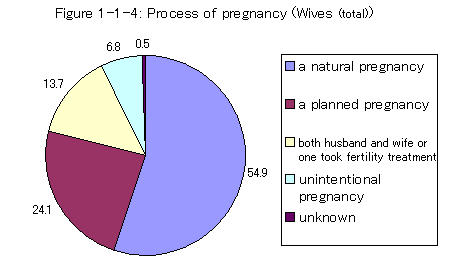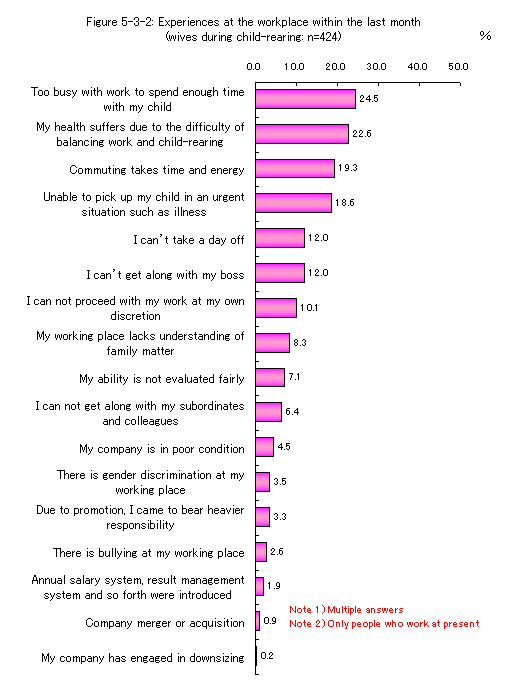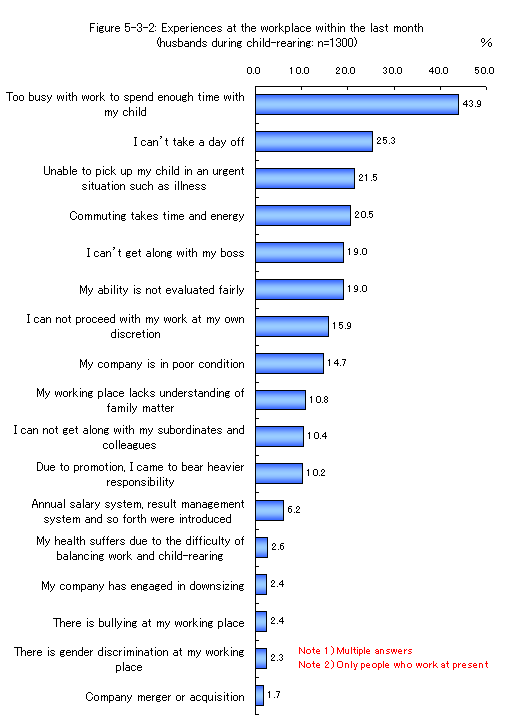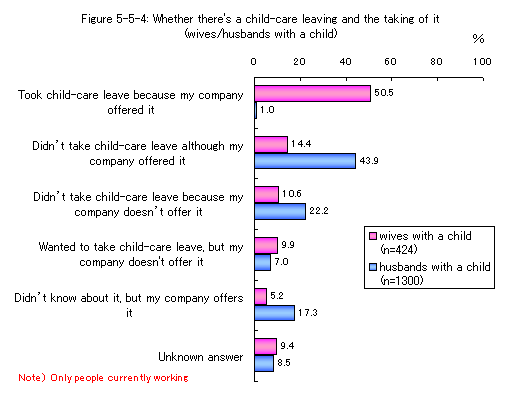Japan is currently experiencing a declining birthrate. In 2005, total fertility rate fell to 1.26. The trend toward nuclear families is particularly strong in urban areas. The number of families made up of only couples and their children is increasing. Many husbands in their thirties, however, cannot share childrearing responsibilities because they are busy with work. For instance, a survey shows that 27% of men in their thirties average more than 60 hours of work a week1).
Benesse Corporation Inc. and Benesse Institute on Child Sciences, Parenting, and Aging (BICSPA) conducted a research survey with the specialists including Dr. Noboru Kobayashi, Director of Benesse Institute for the Child Sciences, Director of Child Research Net, Parenting, and Aging Inc., Professor Emeritus of the University of Tokyo, Dr. M. Sugawara, a psychologist at Ochanomizu University in November 2006. We sent questionnaires to 8,000 couples expecting their first child, or parents whose first child was 0 to 2 years old, and received 4,479 responses. The main research questions asked about the process of being parents-how husbands and wives become parents through their experiences of conception, birth of the first child, and childrearing. Based on this study, we would like to make some meaningful suggestions for the happy parenting and have selected some interesting data as follows. How is the childrearing environment in your society? We welcome your comments.
1. Process of the pregnancy
More than half of the 2,588 couples answered that conception occurred naturally without the use of family planning. 24.1% had planned the birth of their first child. 13.7% conceived as a result of the fertility treatment. The rate of conception by fertility treatment increases with the age of the women surveyed. For instance, one out of four women who were older than 35 years of age upon having their child conceived through fertility treatment.
The average marriage age is now increasing in Japan. It tends to become more difficult for women to conceive with increasing age and they give birth to fewer children. Due to the high cost of fertility treatment in Japan and insufficient public subsidies, couples who cannot afford the treatment must forego it. As a measure against the declining birthrate, I suggest it is necessary to pay more attention to the issues and conditions that affect couples before giving birth.
2. Work Life Balance of the families
Under the Child-care Leave Law in Japan, both fathers and mothers with a child under the age of one can take child-care leave. According to the results of the survey, 81% of pregnant working women wanted to take the leave, and 34.6% of the fathers-to-be wanted to take the leave themselves.
However, only 1.0% of the fathers actually took the child-care leave. As for working mothers, 50.5% took the leave. Though the samples were different, there is a gap between needs and reality. In reality, 43.9% of the fathers answered that they did not take the child-care leave although their companies offered a system of child-care leave.
The survey focused on a variety of subjects regarding parenting and childrearing such as parental stress, marital relationships, etc. The data is now being analyzed, and a report will be published in this coming autumn 2007 from BICSPA. I would like to report the details on the CRN website again in autumn. Please feel free to send comments or questions.
1) 2003 White Paper on the Labour Economy (Ministry of Health, Labour and Welfare)
Benesse Corporation Inc. and Benesse Institute on Child Sciences, Parenting, and Aging (BICSPA) conducted a research survey with the specialists including Dr. Noboru Kobayashi, Director of Benesse Institute for the Child Sciences, Director of Child Research Net, Parenting, and Aging Inc., Professor Emeritus of the University of Tokyo, Dr. M. Sugawara, a psychologist at Ochanomizu University in November 2006. We sent questionnaires to 8,000 couples expecting their first child, or parents whose first child was 0 to 2 years old, and received 4,479 responses. The main research questions asked about the process of being parents-how husbands and wives become parents through their experiences of conception, birth of the first child, and childrearing. Based on this study, we would like to make some meaningful suggestions for the happy parenting and have selected some interesting data as follows. How is the childrearing environment in your society? We welcome your comments.
1. Process of the pregnancy

More than half of the 2,588 couples answered that conception occurred naturally without the use of family planning. 24.1% had planned the birth of their first child. 13.7% conceived as a result of the fertility treatment. The rate of conception by fertility treatment increases with the age of the women surveyed. For instance, one out of four women who were older than 35 years of age upon having their child conceived through fertility treatment.
The average marriage age is now increasing in Japan. It tends to become more difficult for women to conceive with increasing age and they give birth to fewer children. Due to the high cost of fertility treatment in Japan and insufficient public subsidies, couples who cannot afford the treatment must forego it. As a measure against the declining birthrate, I suggest it is necessary to pay more attention to the issues and conditions that affect couples before giving birth.
2. Work Life Balance of the families


Under the Child-care Leave Law in Japan, both fathers and mothers with a child under the age of one can take child-care leave. According to the results of the survey, 81% of pregnant working women wanted to take the leave, and 34.6% of the fathers-to-be wanted to take the leave themselves.
However, only 1.0% of the fathers actually took the child-care leave. As for working mothers, 50.5% took the leave. Though the samples were different, there is a gap between needs and reality. In reality, 43.9% of the fathers answered that they did not take the child-care leave although their companies offered a system of child-care leave.

The survey focused on a variety of subjects regarding parenting and childrearing such as parental stress, marital relationships, etc. The data is now being analyzed, and a report will be published in this coming autumn 2007 from BICSPA. I would like to report the details on the CRN website again in autumn. Please feel free to send comments or questions.
1) 2003 White Paper on the Labour Economy (Ministry of Health, Labour and Welfare)














